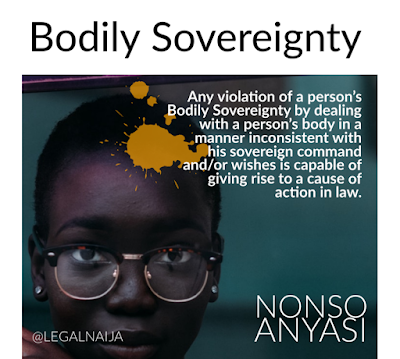
The legal philosopher John Locke postulated in his Two Treatises on Government that every man has a property in his own Person. The individual has the right to decide what would become of himself and what he would do, and as having a right to reap the benefits of what he did.
This concept also known as the “Principle of Bodily Sovereignty” in legal parlance presupposes the existence of a legal right in an individual to determine what that individual does with his own body. The principle presumes the existence of both independence and autonomy in making decisions which affects one for oneself.
This principle of Bodily Sovereignty is applicable to all human beings irrespective of race, tribe, sex, or station in life. It is a consequential and binding bye-product of the cardinal international principle of Self-Determination as enshrined in the United Nations Charter. It is a jus cogens principle which must be respected by all persons, authorities, and governments. Therefore, any violation of a person’s Bodily Sovereignty by dealing with a person’s body in a manner inconsistent with his sovereign command and/or wishes is capable of giving rise to a cause of action in law. The criminal laws of various nations have also penalized the offence of unauthorized handling of a person’s body with harsh consequences.
Hence, every human being, both male and female, have a right to determine what to do with and also what happens to his/her body. The females especially in the unenlightened part of Africa are largely unaware of the existence of this legal property rights in their bodies. Many African women do indeed accept that a property exists in their bodies, but they fail to realize that they are the sole owners of this proprietary rights. Some have the erroneous misconception that they lack the will power or resources to exercise full control over their bodies and actions, and thus must subjugate themselves to the domineering authority of one who can effectively manage this property: a man.
The law has already given the woman a moral or natural right to govern her actions and her body. It is left for the woman to enforce strict adherence to this right. The right continues till one ceases to be a person, hence, it would be foolhardy to posit that the right to bodily integrity is surrendered upon entering into a social relationship such as marriage. Marriage indeed creates an exclusive social contract wherein two persons form a union which confers right on the one on the other. However, the two parties to a marriage do not cease to be “persons”. Thus, neither of the parties to a marriage contract is expected to unilaterally surrender his/her bodily sovereignty to the other. It must be conceded that marriage creates a constructive consent for one to deal in his spouse’s body. Therefore, consent thereof can be implied where it is not expressly withheld.
However, an express withdrawal of consent negates whatever constructive consent the marriage may have implied. It is therefore a violation of a woman’s Bodily Sovereignty for her husband to continue to handle her body in a manner inconsistent with his wife’s wishes.
There are many acts which amount to a violation of a woman’s bodily sovereignty. These include but are not limited to: touching a woman’s body in an unauthorized way, forcing a woman to touch another person against her wishes, making decisions on behalf of a woman where such responsibility was not expressly delegated, etc. In fact, any unauthorized dealing with a woman’s person is a violation of her Bodily Sovereignty.
It therefore behooves on the Nigerian woman to avail herself of this protection afforded by the law to assert her Bodily Sovereignty from all forms of violations in whatever form it may appear.

Nonso Anyasi
@oluwanonso_esq
